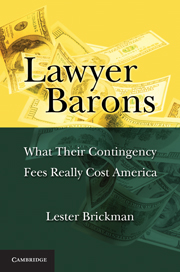Book contents
- Frontmatter
- Contents
- Foreword: Sorting Out Our National Liability Crisis by Richard A. Epstein
- Acknowledgments
- LAWYER BARONS
- Introduction
- 1 The Origin of the Contingency Fee
- 2 How Profitable Are Contingency Fees?
- 3 Are Contingency Fee Profits “Reasonable”?
- 4 How Tort Lawyers Have Increased Their Profits by Restraining Competition
- 5 Why the Market Has Failed to Correct the Absence of Price Competition
- 6 Impediments Imposed by the Bar to Price Competition
- 7 The Effects of Incentives Created by Contingency Fees
- 8 How the Quest for Profits Influenced the Development of the Tort System
- 9 Lawyers' Role in the Expansion of Tort Liability
- 10 The Role of the Judiciary in Tort System Expansion
- 11 Current and Future Expansions of Tort Liability
- 12 The “Litigation Explosion”
- 13 Measures of the Rate of Expansion of Tort Liability
- 14 The Relationship between Injury Rates and Tort System Costs
- 15 The Impacts of Substantial Increases in Tort Lawyers' Effective Hourly Rates
- 16 Class Actions
- 17 Fees in Class Actions
- 18 How Class Action Lawyers Game Fee Setting
- 19 Securities Class Actions
- 20 Regulation through Litigation
- 21 A New Role for Punitive Damages
- 22 For-Profit Partnerships between State Attorneys General and Contingency Fee Lawyers
- Conclusion
- Appendix A A Critique of Alex Tabarrok
- Appendix B Calculating Tort Lawyers' Effective Hourly Rates in 1960
- Appendix C Electronic Discovery and the Use of Contract Lawyers
- Appendix D The HMO Litigation
- Appendix E The GM “Side Saddle” Truck Litigation
- Appendix F Modern Class Actions Undermine Democratic Precepts
- Appendix G Other Ways Lawyers Game Class Action Fees
- Appendix H Nonrecourse Financing of Tort Litigation
- Appendix I Political Contributions by Tort Lawyers and the U.S. Chamber of Commerce
- Appendix J Special Rules Favoring Lawyers
- Appendix K The Ultimate Medical Expense “Buildup”: Whiplash
- Appendix L The Effect of Punitive Damages on Compensatory Awards
- Index
18 - How Class Action Lawyers Game Fee Setting
Published online by Cambridge University Press: 05 June 2012
- Frontmatter
- Contents
- Foreword: Sorting Out Our National Liability Crisis by Richard A. Epstein
- Acknowledgments
- LAWYER BARONS
- Introduction
- 1 The Origin of the Contingency Fee
- 2 How Profitable Are Contingency Fees?
- 3 Are Contingency Fee Profits “Reasonable”?
- 4 How Tort Lawyers Have Increased Their Profits by Restraining Competition
- 5 Why the Market Has Failed to Correct the Absence of Price Competition
- 6 Impediments Imposed by the Bar to Price Competition
- 7 The Effects of Incentives Created by Contingency Fees
- 8 How the Quest for Profits Influenced the Development of the Tort System
- 9 Lawyers' Role in the Expansion of Tort Liability
- 10 The Role of the Judiciary in Tort System Expansion
- 11 Current and Future Expansions of Tort Liability
- 12 The “Litigation Explosion”
- 13 Measures of the Rate of Expansion of Tort Liability
- 14 The Relationship between Injury Rates and Tort System Costs
- 15 The Impacts of Substantial Increases in Tort Lawyers' Effective Hourly Rates
- 16 Class Actions
- 17 Fees in Class Actions
- 18 How Class Action Lawyers Game Fee Setting
- 19 Securities Class Actions
- 20 Regulation through Litigation
- 21 A New Role for Punitive Damages
- 22 For-Profit Partnerships between State Attorneys General and Contingency Fee Lawyers
- Conclusion
- Appendix A A Critique of Alex Tabarrok
- Appendix B Calculating Tort Lawyers' Effective Hourly Rates in 1960
- Appendix C Electronic Discovery and the Use of Contract Lawyers
- Appendix D The HMO Litigation
- Appendix E The GM “Side Saddle” Truck Litigation
- Appendix F Modern Class Actions Undermine Democratic Precepts
- Appendix G Other Ways Lawyers Game Class Action Fees
- Appendix H Nonrecourse Financing of Tort Litigation
- Appendix I Political Contributions by Tort Lawyers and the U.S. Chamber of Commerce
- Appendix J Special Rules Favoring Lawyers
- Appendix K The Ultimate Medical Expense “Buildup”: Whiplash
- Appendix L The Effect of Punitive Damages on Compensatory Awards
- Index
Summary
IN COMMON-FUND CLASS ACTIONS, THE INTERESTS OF THE lawyers who bring the class action diverge from those of the class when it comes time to set the fee. Because the fee comes from the common fund, a zero-sum game prevails: The more the lawyers are awarded, the less there is available for the class.
A similar conflict of interest arises in cases initiated under a statute with a fee-shifting provision, which allows the court to order a settling defendant to pay the plaintiffs' attorneys fee and costs in addition to the settlement amount. In these cases, defendants are concerned about the total payment required to settle the action, which consists of the payment to the class plus the payment of the class lawyer's fee. For this reason, the parties often simultaneously negotiate the settlement amount and the fee so that the defendant has a fix on the total cost of the settlement. But this presents the parties with the opportunity to trade a higher fee for a more-than-offsetting lower settlement amount for the class. Even when the shifted fee is negotiated after the settlement is reached, the defendant takes the expected fee reimbursement into account in agreeing to the terms of the settlement. Courts are well aware of the incentives for collusion in these circumstances and maintain that they carefully scrutinize such settlements. Even so, many collusive settlements gain approval.
- Type
- Chapter
- Information
- Lawyer BaronsWhat Their Contingency Fees Really Cost America, pp. 335 - 372Publisher: Cambridge University PressPrint publication year: 2011



